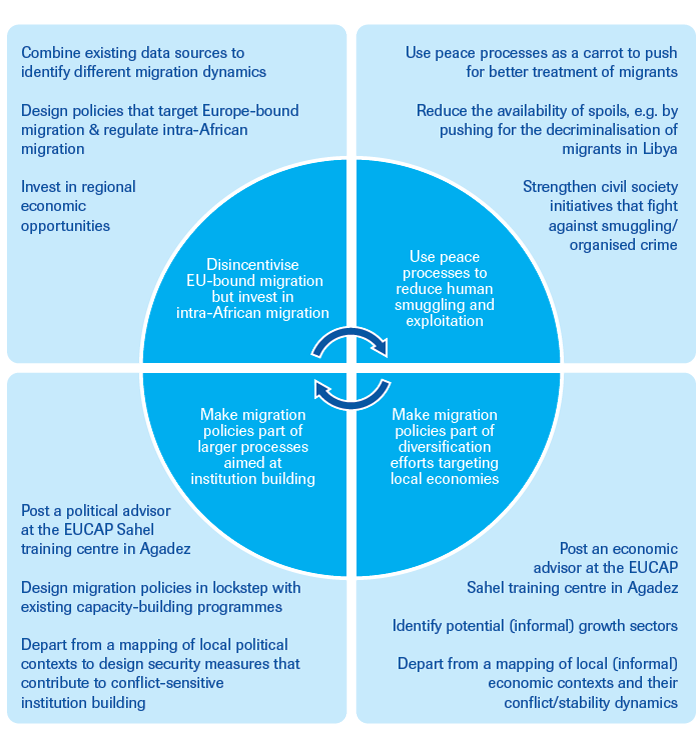Irregular migration is not an isolated phenomenon. Instead, such migration forms part of larger political economies and contributes to a diverse set of conflictive and stabilising socio-political dynamics. Untangling these relationships, and the effects that regulating migration has on them, is crucial for the design of effective migration policies that do not unintentionally increase rather than decrease one of the main root causes of migration. To this end, this report analyses irregular migration in Mali, Niger and Libya. Studying the human smuggling networks that operate within and across these three countries provides insights into the transnational dynamics of irregular migration as well as these networks’ interaction with local, national and regional political and economic dynamics.
The report’s main finding is that current EU policies are misaligned with the reality of trans-Saharan migration. These policies start from the assumption that all migrants on the trajectory between West Africa and North Africa intend to travel to Europe and that – given the EU’s inability to effectively cooperate with Libya in controlling migration – these flows should and could be stemmed in migration hubs such as Agadez (Niger). In reality, an estimated 20 percent of migrants travelling on this route ultimately take the boat to Europe, with the remainder of trans-Saharan migration constituting a circular and temporary intra-African livelihood protection strategy. Insufficient attention is paid to the need to distinguish between these different migratory logics and their contribution to local livelihoods and stability.
In addition, EU migration policies contain a strong focus on securitised measures as a means to stop the human smuggling networks held responsible for the facilitation of irregular migration. In reality, human smuggling networks form part of larger political economies and cannot be addressed effectively without taking into account the extent to which state authorities are involved in and/or capable of controlling irregular migration. Failure to take these local realities into account results in inefficient and ineffective policies at best, and counterproductively strengthens one of the root causes of migration at worst, because it overlooks the intricate links that exist between migration and conflict and stability in the region.
The report therefore makes a strong case for greater attention to be devoted to the different local political economies of irregular migration. Actors involved in these economies include transport companies that facilitate the irregular movement of undocumented migrants, local populations that sell lodgings and food to earn a living, local security forces that up their income through bribery and road taxes, political elites that use the financial resources earned through the facilitation of irregular migration to buy political favours and influence, armed groups that feed off human smuggling and exploitation to strengthen their position and detention centres that lock up irregular migrants under the worst of conditions. Understanding these different actors and their relationship to local governance and stability/conflict dynamics is a necessary prerequisite for effective migration management.
Click on the highlighted areas for more detail

Recognising that trans-Saharan irregular migration forms part of larger stability and governance dynamics has the added benefit that it allows policy makers to fall back on the mass of expertise that has been gathered over the last decades in the field of state building, security and justice programming and informal economies and private sector development. The report offers practical recommendations, summarised in the figure below, that facilitate the incorporation of these insights in the design of migration policies that strengthen rather than undermine regional political institutions and stability. In particular, the report recommends that policy makers invest in comprehensive peace processes in northern Mali and Libya and strengthen intra-African migration and regional economic development to ensure that local populations can continue to rely on regional migration as an escape valve while diverting migration flows away from Europe.
In addition, migration policies should be mindful that the trans-Saharan migration economy feeds into pre-existing hybrid governance schemes and that attempts to work with state institutions should form part of a larger approach targeting the quality of governance. This should take the form of parallel investments in responsible security sector reform and institution building. Most importantly, perhaps, the migration industry has fuelled a process of regional development that can be capitalised upon to spur a larger process of growth and stability in the region and thereby tackle the lack of prospects for change – including economic opportunities – as a root cause of migration. Given that migratory pressure is only expected to increase in the near future, the EU should capitalise on this opportunity to invest in the region’s capacity to provide its population with tangible prospects.

